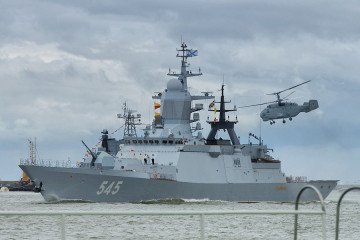- Category
- Latest news
Western Shipowners Earn $6 Billion Selling Old Tankers to Russia’s Shadow Fleet
-4ee856679c4b0b4ed42d77055bfc1575.jpg)
Western shipowners have earned over $6 billion by selling aging oil tankers to a fleet that transports Russian oil, according to an international investigation by Follow the Money released on February 4.
Businesses from Germany, Norway, the United Kingdom, and, most notably, Greece sold old, often unsafe vessels at significantly inflated prices. These ships are now used to transport Russian oil, bypassing sanctions and providing substantial revenue to Russia amid its war against Ukraine.
More than a third of the shadow fleet transporting Russian oil comprises vessels previously owned by shipowners from Western countries that have sanctioned Russia.
The investigation found that 230 aging tankers, which might otherwise have been scrapped, were sold at high prices. The proceeds from these sales totaled over $6 billion. The shadow fleet enables Russia to export oil above the price cap set by Western nations, generating billions in revenue. While sanctions against this trade have increased, there has been little effort to prevent the sale of old tankers to entities linked to Russia.
The Kyiv School of Economics Institute compiled a list of tankers with opaque ownership that have been transporting Russian oil.
Follow the Money's "Shadow Fleet Secrets" investigation, conducted in collaboration with 13 newsrooms and 40 journalists worldwide, examined the ownership structures of these vessels.
Greek businessman Paris Kassidokostas-Latsis, heir to one of Greece’s wealthiest families, was among those who profited from these sales. His company, Marla Tankers, sold two oil tankers in late 2024 for 84 million dollars—nearly double the price he had paid six years earlier.
The new owner, Phuong Dong Petrol Transportation, is based in Hanoi, Vietnam, and had prior involvement in the shadow fleet. After the sale, the ships were renamed and reflagged from Malta to Panama. By December 2024, both tankers had transported large quantities of Russian oil from Ust-Luga, a Baltic port near Estonia.
Since the start of the war, Russia has generated over ($823.6 billion) euros from fossil fuel exports. The tankers not only transport oil but have also been linked to espionage activities, mapping critical infrastructure, and damaging undersea power cables.
Despite efforts to curb this trade, shipowners from 21 of the 35 sanctioning countries have sold vessels that later joined the shadow fleet. Greek, British, and German companies accounted for the majority of these sales.
The European Union banned direct sales of ships to Russian companies in late 2023, but the measure had limited impact. Most vessels are not directly owned by Russian entities but are registered in third countries such as India, Seychelles, Hong Kong, and Vietnam, making the sales legally permissible.
The Kyiv School of Economics estimates that over 600 tankers, constituting 70% of Russia’s oil exports, operate within this shadow fleet. These vessels avoid European ports, circumventing inspections and regulatory scrutiny.
The EU, US, and UK have increased pressure on companies facilitating Russian oil transport. Authorities have sanctioned over 300 oil tankers, including 68 by the EU and 235 by the US. In the final days of the Biden administration, the US imposed sanctions on 155 vessels in what has been described as the most significant move against the shadow fleet to date.
Despite these efforts, some EU member states, particularly Greece, Cyprus, and Malta, have resisted stricter shipping sanctions. In 2023, a European Commission proposal requiring shipowners to include contractual restrictions on reselling vessels for Russian oil transport failed to gain unanimous support. Greece’s economy heavily relies on shipping, generating 14 billion euros annually, nearly 8% of GDP. Greek companies have sold 127 vessels—55% of the Western-owned tankers now in the shadow fleet.
Benjamin Hilgenstock, chief economist at the Kyiv School of Economics, argues that the continued sale of vessels into the shadow fleet indicates that existing sanctions are insufficient.
However, EU sanctions envoy David O’Sullivan maintains that while some circumvention is inevitable, the sanctions regime is gradually increasing costs and logistical challenges for Russia.
Meanwhile, the tankers sold by Kassidokostas-Latsis remain active. As of late January, the Fos Picasso had docked in Mangalore, India, where its oil was offloaded for processing. The Fos Da Vinci, carrying millions of dollars' worth of Russian oil, was en route to India.
As of February 3, it was reported that Russias Shadow Fleet has grown to nearly 1,000 vessels.
-554f0711f15a880af68b2550a739eee4.jpg)
-11b58f58a83d9b0f8fe40066449b041e.jpeg)






-72b63a4e0c8c475ad81fe3eed3f63729.jpeg)